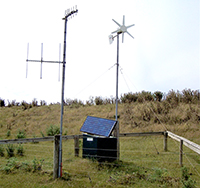I want to...
Current filter: Most popular
A to Z
Apply for a job
Biosecurity
Consents
Consultation
Contact Us
Environmental Data
Farmers Hub
Fix it or Report it
Information Request
Join an Event
Leasehold Land
Meetings
Rates
Water Metering
Have Your Say
Climate Briefing at HBRC
Published: 2 February 2017

A climate briefing today (2 February) by Hawke’s Bay Regional Council environmental scientists was attended by a large group of interested people from the agriculture and horticulture sector.
Climate – HBRC Climate scientist Dr Kathleen Kozyniak:
- The region is drier than normal for this time of year. The region’s January rainfall was 35% of normal for that month, with the Heretaunga Plains being even lower at 15% and Wairoa at 13%. The persistent westerly flows have made for a wet summer in the west of the North Island but they failed to push rain across the ranges.
- Soil moisture around the region is at record lows for the time of year at various monitors around the region that were installed only about ten to fifteen years ago.
- The outlook is for the westerly flows to continue into February, and for rainfall and soil moisture to be near or below average.
Rivers - Jeff Smith, HBRC principal hydrology scientist:
- Rivers and streams are extremely low compared to normal for this time of year. The exception is the Mohaka which has headwaters high up in the ranges and had above normal rainfall. The Tukituki and Ngaruroro river levels are around the same as in the 2012/13 dry.
- The NIWA forecast is for rivers to be near or below normal.
Groundwater - Simon Harper, HBRC groundwater scientist:
- The Heretaunga Plains aquifers has reached record low levels for January across most of the monitor wells. The Flaxmere monitor well, for example, is about 30 centimetres lower than the previous monthly lows measured in 2012/13.
- In some areas lower than normal groundwater levels are problematic for wells that rely on artesian water or which access groundwater using surface pumps. Surface pumps have limited draw capacity so when groundwater drops below the pump intake, the regional council often receives calls about wells running dry.
- Increasing seasonal variation in aquifer levels means some wells may benefit from changes to their pump setup to secure supply during summer periods.
- Spring-fed streams in the area are not getting their normal flow of water.
- People with artesian wells towards the coast have reported drops in pressure.
- The Ruataniwha aquifer pattern is typically for larger drops in levels. Near Tikokino (at Mr Apple’s bore) there was 2 metre decline between the previous record low for January (2013) and this year’s levels.
- In terms of future groundwater use, the TANK process that is underway with sector groups looking at land and water policy development for the Tutaekuri, Ahuriri, Ngaruroro and Karamu catchments, is using computer modelling to consider various scenarios and options for the future management of river and aquifer water. These include looking at managed water storage and whether potentially higher demand in the future will mean the aquifer will stabilize or keep declining.
Following the briefing, the Hawke’s Bay rural advisory group met to discuss the dry conditions and any action that might be needed to coordinate a response. The group agreed that the region is not near the threshold to deem the dry period a drought as farmers still have options available.
Disclaimers and Copyright
While every endeavour has been taken by the Hawke's Bay Regional Council to ensure that the information on this website is
accurate and up to date, Hawke's Bay Regional Council shall not be liable for any loss suffered through the use, directly or indirectly, of information on this website. Information contained has been assembled in good faith.
Some of the information available in this site is from the New Zealand Public domain and supplied by relevant
government agencies. Hawke's Bay Regional Council cannot accept any liability for its accuracy or content.
Portions of the information and material on this site, including data, pages, documents, online
graphics and images are protected by copyright, unless specifically notified to the contrary. Externally sourced
information or material is copyright to the respective provider.
© Hawke's Bay Regional Council - www.hbrc.govt.nz / +64 6 835 9200 / info@hbrc.govt.nz


